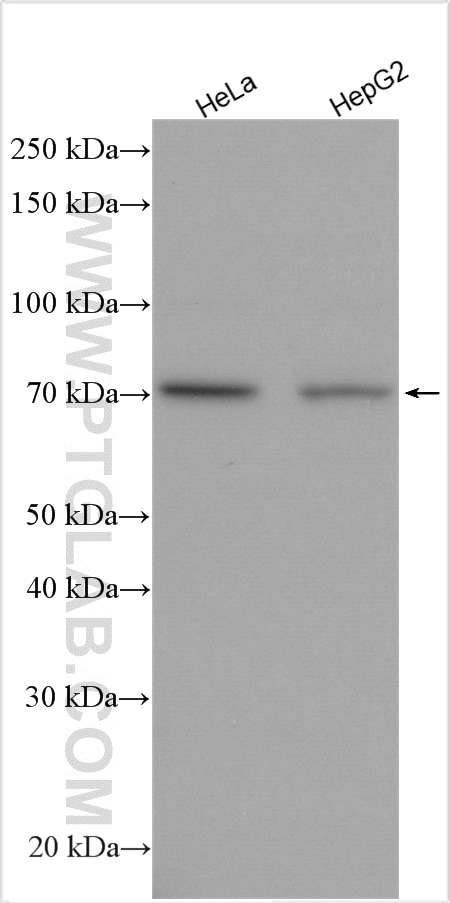TNFAIP2 Polyklonaler Antikörper
TNFAIP2 Polyklonal Antikörper für WB, ELISA
Wirt / Isotyp
Kaninchen / IgG
Getestete Reaktivität
human und mehr (1)
Anwendung
WB, ELISA
Konjugation
Unkonjugiert
Kat-Nr. : 25649-1-AP
Synonyme
Geprüfte Anwendungen
| Erfolgreiche Detektion in WB | HeLa-Zellen, HepG2-Zellen |
Empfohlene Verdünnung
| Anwendung | Verdünnung |
|---|---|
| Western Blot (WB) | WB : 1:500-1:2000 |
| It is recommended that this reagent should be titrated in each testing system to obtain optimal results. | |
| Sample-dependent, check data in validation data gallery | |
Veröffentlichte Anwendungen
| WB | See 3 publications below |
Produktinformation
25649-1-AP bindet in WB, ELISA TNFAIP2 und zeigt Reaktivität mit human
| Getestete Reaktivität | human |
| In Publikationen genannte Reaktivität | human, Hund |
| Wirt / Isotyp | Kaninchen / IgG |
| Klonalität | Polyklonal |
| Typ | Antikörper |
| Immunogen | TNFAIP2 fusion protein Ag19150 |
| Vollständiger Name | tumor necrosis factor, alpha-induced protein 2 |
| Berechnetes Molekulargewicht | 654 aa, 73 kDa |
| Beobachtetes Molekulargewicht | 73 kDa |
| GenBank-Zugangsnummer | BC128449 |
| Gene symbol | TNFAIP2 |
| Gene ID (NCBI) | 7127 |
| Konjugation | Unkonjugiert |
| Form | Liquid |
| Reinigungsmethode | Antigen-Affinitätsreinigung |
| Lagerungspuffer | PBS with 0.02% sodium azide and 50% glycerol |
| Lagerungsbedingungen | Bei -20°C lagern. Nach dem Versand ein Jahr lang stabil Aliquotieren ist bei -20oC Lagerung nicht notwendig. 20ul Größen enthalten 0,1% BSA. |
Hintergrundinformationen
TNFAIP2, also named as B94, belongs to the SEC6 family. TNFAIP2 may play a role as a mediator of inflammation and angiogenesis. TNFAIP2 is differentially expressed in development and capillary tube-like formation in vitro. It is induced by TNFα and other proinflammatory factors.
Protokolle
| PRODUKTSPEZIFISCHE PROTOKOLLE | |
|---|---|
| WB protocol for TNFAIP2 antibody 25649-1-AP | Protokoll herunterladen |
| STANDARD-PROTOKOLLE | |
|---|---|
| Klicken Sie hier, um unsere Standardprotokolle anzuzeigen |
Publikationen
| Species | Application | Title |
|---|---|---|
Exp Cell Res TGF-β-Induced Acetylation of KLF5 Drives TNFAIP2 Transcription and EMT in Nasopharyngeal Carcinoma: Unveiling a Novel Regulatory Mechanism | ||
Cell Commun Signal NEDD4L mediates ITGB4 ubiquitination and degradation to suppress esophageal carcinoma progression |


